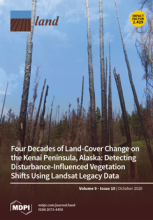Land Library
Welcome to the Land Portal Library. Explore our vast collection of open-access resources (over 74,000) including reports, journal articles, research papers, peer-reviewed publications, legal documents, videos and much more.
/ library resources
Showing items 1 through 9 of 44.Informal settlements represent a challenging operational context for local government service providers due to precarious contextual conditions.
Issues relating to land are specifically referred to in five of the United Nations’ (UN) 17 Sustainable Development Goals, and UN-Habitat’s Global Land Tools Network views access to land and tenure security as key to achieving sustainable, inclusive and efficient cities.
Land degradation has become one of the major global environmental problems threatening human well-being. Whether degraded land can be restored has a profound effect on the achievement of the 2030 UN Sustainable Development Goals.
This study investigates the main threats related to environmental degradation that affect Amazonian Indigenous Lands (ILs). Through a cluster analysis, we group ILs according to the set of common environmental threats that occur within and outside their limits.
As the global population continues to urbanize, increasing pressure is put upon urban centers and the carrying capacity of the already built-up areas. One way to meet these demands is horizontal expansion, which requires new lands to become incorporated into urban centers.
This paper reviews experiences and development impacts of a selected number of developing countries in Asia and Africa that have used emerging land registration approaches to rapidly secure land rights at scale.
Land degradation, especially soil erosion, is a societal issue that affects vineyards worldwide, but there are no current investigations that inform specifically about soil erosion rates in Chinese vineyards.
Although land forms the basis for marginal livelihoods in Sub-Saharan Africa, the asset is more strategic for women as they usually hold derived and dependent rights to land in customary tenure areas.
Achieving change to address soil erosion has been a global yet elusive goal for decades. Efforts to implement effective solutions have often fallen short due to a lack of sustained, context-appropriate and multi-disciplinary engagement with the problem.


